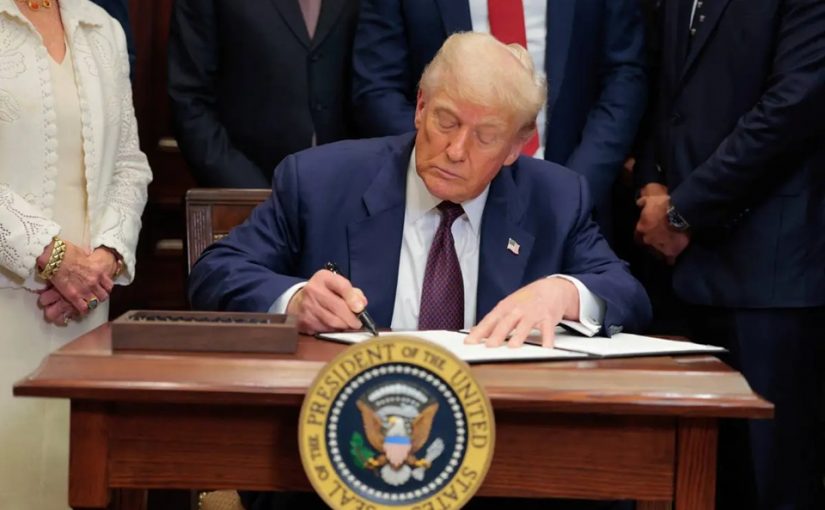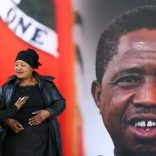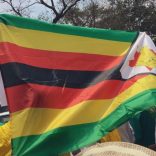Zambia's president not wanted at predecessor's funeral, family says
Trump imposes 30% tariffs on South Africa

FILE - US President Donald Trump signs an executive order in the Roosevelt Room of the White House. [File photo: AFP]
South Africa has failed to negotiate a trade deal with the United States before the 1 August deadline, with the country now set to be hit by a 30% tariff on exports to its second largest trade partner in seven days.
Despite a last-ditch attempt to sweeten its offer to the US ahead of the implementation date, the Trump administration confirmed that the tariff will take effect.
US President Donald Trump signed an executive order adjusting the tariffs applied to various countries, including the 30% tariff for South Africa.
Notably, the order states that:
“These (tariff) modifications shall be effective with respect to goods entered for consumption, or withdrawn from warehouse for consumption, on or after 00h01 eastern daylight time, 7 days after the date of this order.”
This implies an effective date of 07h01 on 7 August, which may give countries like South Africa a small window to try and change things.
In the order, Trump acknowledged “some trading partners” that have agreed to, or are on the verge of agreeing to, meaningful trade and security commitments with the United States.
However, he also noted that other trading partners, “despite having engaged in negotiations, have offered terms that, in my judgment, do not sufficiently address imbalances in our trading relationship.”
Various South African government departments, delegations and officials have been trying to develop a trade package over the past few months that would be accepted by the White House to bring the rate down.
However, they were reportedly given the cold shoulder at almost every turn, making the process incredibly difficult.
Earlier in the week, the Department of Trade, Industry and Competition (DTIC) outlined what it had offered the US as part of its near-final package.
This included:
- Importing 750-100 petajoules of Liquified Natural Gas for a 10-year period, unlocking $12 billion;
- Agricultural Market Access by simplifying of US poultry exports under the 2016 tariff rate quota and unlock approximately $91 million million in trade.
- Readiness to open market access for blueberries, subject to necessary protocols.
- South African firms are committed to investing $3.3 billion in US industries such as mining and metals recycling;
- Joint investment in critical minerals, pharmaceuticals, and agri-machinery.
- Exemption of specific sectors from reciprocal tariffs to preserve supply chains, e.g. ship building, counter-seasonal agriculture trade, and exports from MSMEs of less than $1 million per annum.
According to the department, South Africa’s development of the trade deal went down to the wire, with last-minute changes being made as late as Thursday (31 July).
Speaking to 702’s Bongani Bingwa, DTIC minister Parks Tau said that the country had been in communication with the Trump administration up to the “11th hour”, but even the US had expressed uncertainty about what the final move would be.
“They indicated that they are unable to confirm what the announcement will be, and encouraged us to resubmit an enhanced proposal that will be processed by the White House,” he said.
However, the minister conceded that it was too late in the game to be negotiating, and the government had to take a ‘wait and see’ approach, like many other countries.
According to Tau, the trade negotiations had been incredibly complex due to it being a trade and political issue.
He noted that it wasn’t just one or the other, as many countries were in the same boat as South Africa, which didn’t have any geopolitical issues with the US.
At the same time, however, it is evident that politics—such as South Africa’s stance on Israel and local BEE policies—were in play.
Tau said that International Relations Minister Ronald Lamola has been in the US to address the political issues in a parallel process to the trade negotiations.
“We have to deal with the reality that, on the trade issues, we are one of many who are dealing with this,” he said.
“We are working all out to address it on all sides. We have pulled out all the stops, engaging with the US through delegations, through business and various channels.”
What now?
With the 30% tariff in effect for now, key South African industries are expected to feel the impact, particularly in agriculture and in the automotive manufacturing.
Tau said that the government has been in a situation where it has had to plan for different scenarios and will need to fully assess how different sectors and industries will be impacted.
He said that the department has been working down to the industry and firm level to gauge the impact and plot its next move.
In the worst case scenario, South Africa would have to pivot entirely to alternative markets. While this is part of the options the DTIC has been working on, it is not a simple or quick move.
“We have reached out to various other countries with different agreements with South Africa,” he said.
“We’ve had to bring it down to industry level and firm level and ask, what can we do if your products can’t access the US markets?”
The minister said that a special export support desk will go live on Friday to assist impacted businesses and industries.
The department is also engaging with the National Treasury to look at a package of support mechanisms from the government.
However, he stressed that these packages may be sector, industry or even firm level, depending on who, what and how they are impacted by the tariffs.
“It’s difficult to finalise the package until you know what the implications are. There might be industries that can still access the market with 15% or 20% tariffs, but there may be others that cannot, so we may have to look at a tariff support mechanism,” he said.













Leave a Reply
Be the First to Comment!
You must be logged in to post a comment.
You must be logged in to post a comment.